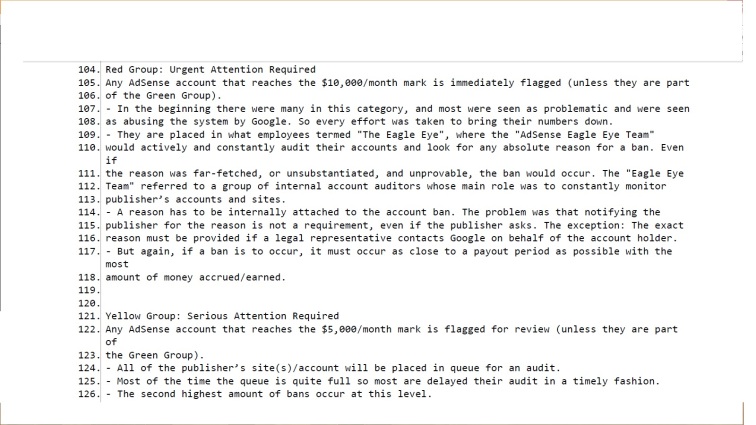Remember the Adsense Whistleblower? What the whistleblower alleged is that Google is essentially stealing money from Adsense publishers in situations that may be subject to an obligation on Google’s part to refund that money to advertisers. Because the whistleblower has not published any documents as evidence for the claims, we don’t have much to go on. So in this way, it’s like almost everything else with the highly, highly secretive Google.
That’s right–Google is canceling accounts supposedly for violating Google’s Adsense policies, but did not give any warning to the publisher or an opportunity to correct the behavior.
But Google sold advertising and kept the money after canceling the account. This is similar to what Google was reported to have done by the BBC when it discovered that its vast advertising network was being used to sell counterfeit Olympics tickets for the London Olympics. Google cancelled the account but kept the money. And it is also a topic that is the subject of Mississippi Attorney General Jim Hood’s latest subpoena to Google for investigating Google’s business practices. (Google shills are trying to pass off Hood’s subpoena as focused on piracy, but if you actually take the time to read the subpoena you will find that it hardly mentions IP theft at all and mostly focuses on how Google enforces its own practices and potential violations of the $500,000,000 plea bargain that Google entered into with the US Department of Justice for violating the Controlled Substances Act.)
The thing to remember about Google’s taking accrued but unpaid Adsense revenue under bogus or false pretenses is that it smacks of fraud. And if Google is not refunding Adsense revenues to advertisers, then not only is it likely defrauding its ad publishers (the sites where the ads appear) it is also defrauding the advertisers. This is not behavior that is protected by the DMCA, the Communications Decency Act, or any other safe harbor. It is quite simply profiting by deceit and that kind of thing is often covered by state law.
When the Pastebin whistleblower first posted these accusations, Google immediately poo-poo’d the post (including the one about a sex harassment claim against well-known political contributor Matt Cutts who took a leave of absence from Google shortly after the Pastebin post.) But now we are starting to see a conga line of lawsuits against Google for largely the same thing.
Business Insider reports that:
One company, Pubshare, has sued Google for nearly $1 million in revenue it allegedly earned from ads, which Google declined to pass on to the company….Google asked the court to dismiss the case, but a judge ruled to let it proceed. The company has recently indicated that it is bowing to pressure from publishers: In a blog post, it said it would be “making some changes” when considering whether publishers should be banned.
“Allowing an AdSense publisher to accumulate hundreds of thousands of dollars in earnings without any warnings of improper practices, and then abruptly refusing to pay out any of those earnings by means of auto-generated form e-mails is the very definition of bad faith,” says Randy Gaw, a lawyer at the San Francisco firm Gaw Poe, which represents Ogtanyan.
Google declined to comment on this story when contacted by Business Insider….Four different companies have told Business Insider they are talking to their lawyers about suing the search giant for fraud. Three have actually sued, according to copies of the litigation obtained by Business Insider.
In total, Business Insider has heard from seven companies that say they lost tens or hundreds of thousands of dollars when they were suddenly banned from AdSense. All the companies say they were following Google’s strict rules about how to place ads on their site. Some of them say they were encouraged or given approval for their ad plans by Google’s sales staff. The companies showed us emails, images from their AdSense account dashboards, and online chat transcripts with Google staff to demonstrate their problems.
You have to feel for these Adsense publishers. Remember, Google has acknowledged terminating thousands of Adsense publisher accounts. Former staffer for Vice President Joe Biden turned Google lobbyist Catherine Oyama proudly told Congress how many accounts Google had terminated that is consistent with the whistleblower post and the Business Insider story:

Google also told the world about another bunch of accounts it terminated in a report that may have been written by Fred “shred ’em if you got ’em” Von Lohman, former piracy guru for Google Shill Lister Electronic Frontier Foundation and current Google piracy guru:
(A little free advice to General Hood–Oyama and Von Lohman should be happy to testify in response to the subpoena, which is probably why the Google PR machine is kicking into panic mode.)
So keep an eye on these lawsuits by publishers. But the people who should really be looking into these cases are the advertisers, particularly the small advertisers. The big ad agencies like Publius and WPP can take care of themselves on this kind of thing, and you have to believe that Google takes very good care of them. But where do the mom and pop advertisers who are duped by Google turn? What about the profit from counterfeit products like the London Olympics tickets? Who takes care of those situations?
Given that the US DOJ reportedly apologized to Google for the US Attorney for Rhode Island’s statements regarding Larry Page’s involvement with promoting the sale of illegal drugs, do you think that that mom and pop advertisers or the general public can rely on the federal government to protect them from Google? Or the consumer protection powers of their state attorneys general who are directly accountable to the voters?



Thanks for this. I’ve been very interested in this subject since the pastebin whistleblower, and would love further updates on the subject if you come across any. This could be the straw that breaks Scroogle’s antitrust back.
LikeLike